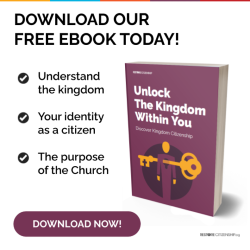This article reveals how Paul uses types and shadows in to highlight kingdom realities.
It’s all prepared, whitewashed and magnificent; this is the mercy of God
See lives like a lamb’s blood poured into basins silver and gold
Witnesses’ watching in scarlet, saying “it is accepted”
One man’s life is shared with all, roasted with the fire of life
Scriptures: Roman 12:1-2, Ps. 113-118
Paul cried out to all citizens of the kingdom by saying “I beseech you therefore, brethren” the beseeching here speaks of a process with a contextual backdrop of the Passover and the temple in mind, which his audience would have understood. To really understand the context of Romans 12 you will need to have a basic understanding of the Passover and the temple rituals. I will try to paint this context and see if it gives us a renewed perspective and a deeper understanding on this magnificent chapter.
Paul adjures the believer to offer something, which would resonate with Jewish citizens of his day. Paul could have been alluding to the time of the Passover in his address when citizens were commanded to go to the temple mount with their Passover lamb. The participants would have been from eight days of age and upward. When the people arrive at the temple mount they would have had to wait until the opening of the temple courtyard doors.
The stones of the altar and the ramp leading to the altar as well as the Temple sanctuary, had to have been whitewashed with plaster for the Passover. The temple courtyard was the place where the sacrifice was to be offered. This gives us more insight into the context to these few verses, however I will not be going into detail in this article. One commentator said “the sight of the sparkling clean Temple must have been magnificent” but I can only envy the statement not having experienced it.
Adjuring in Romans twelve is not totally one of begging but of adherence to the King’s command, in keeping with the similitude of the Levitical order. Once the people arrived the priests then permitted the people to enter the courtyard and divided the crowd into three groups. The people were then permitted to enter the courtyard which had been prepared beforehand denoting what Paul meant “by the mercies of God”. The reason I say this is because the priests were in charge of preparation and not the people. Christ our High Priest is depicted in this role before and after His resurrection and ascension.
As the first group entered, the gates were closed behind them and the shofar (rams horn) was sounded. The blowing of the horn in Romans 12 could be seen in Paul entreating of the citizens. Paul calls all citizens to present their bodies a living sacrifice which was in keeping with the people killing their animals, as a priest caught the blood of the sacrifice in a basin.
During this process other priests stood in two lines, those in one line carried silver basins, and those in the second line carried gold basins. The silver basin denotes redemption and the gold basin denote God’s Kingship (Authority). This process shows God as Judge and Christ depicted and Priest. The blood in the basin shows the quality and uniqueness of our citizenship which is Christ’s life.
As the first priest passed the blood filled basin to the next priest in line, he received an empty basin in return. This exchange continued on down the line until the last priest tossed the blood on the altar. All of the priests involved in this procedure wore scarlet robes so, in the event of an accidental spill, the blood on their clothing would not be noticed. This gives us a good picture of the priest participating in government and the privilege of executing judgement in collaboration with God. We are all giving the privilege of self and corporate examination (judgement) that is in keeping with the same quality of citizenship depicted by the Lord.
After the sacrifice, the animals were taken by their owners and hung on hooks in the walls and pillars. If all the hooks were in use, men held staves between their shoulders, and the carcasses were hung from staves (This gives us a little insight into Romans 7 but I won't go into it here). The lambs were then flayed and taken home to be roasted. As the Passover lambs were slain, the Levite's sang for each incoming group a collection of psalms called the Hallel (Ps. 113-118).
This process speak of presenting one's body. What we see here gives us a greater insight into what Paul meant by present your body a living sacrifice. Let us imagine going through the same process as these lambs? The citizen is called to allow God alone to inflict “a total and permanent termination of all the vital functions, when the organs have not only ceased to act, but have lost the susceptibility of renewed action” i.e. death.
We know that the animals were dead before they were hung but Paul calls the believer to be living (conscious) throughout this depicted process. Close your eyes and imagine the pain and agony that one will have to experience to fulfil this process consciously. But we know that the slaughtering of the animals were performed in a strictly prescribed manner designed to minimize any pain caused to the animal this is why God has to take charge of the believer’s death which shows His mercies even in judgement.
The animal in its entirety was to be eaten. Each lamb was designated to be eaten by predetermined groups. The groups were based on family units. The poor, or people without families, were assigned by the elders to the predetermined groups. No one was allowed to be absent from the Passover meal, on what has come to be known as the Seder night. No one was allowed to go hungry.
If we were to read the entire chapter of Romans twelve through the Jewish eyes and the picture painted for us in the Passover, we will be enrich beyond our imagination. Jesus said “eats my flesh and drinks my blood” in another sense the citizen life is to be consumed by others. The gaps and lack within families, communities and societies is because of our inactive citizenship. It is because we are not living sacrifices that many of us still need to be dealt a fatal blow, hung and roasted. This is a work of the Lord that requires collaboration from the believer.
He who has an ear, let him hear.




